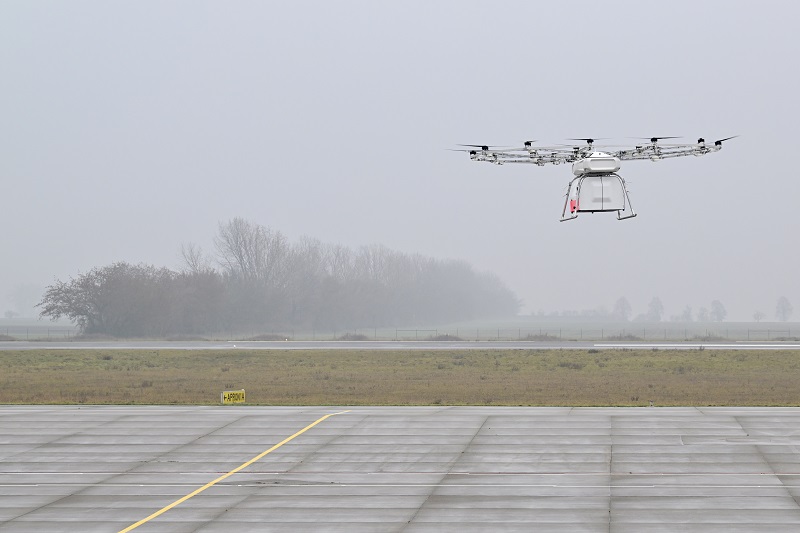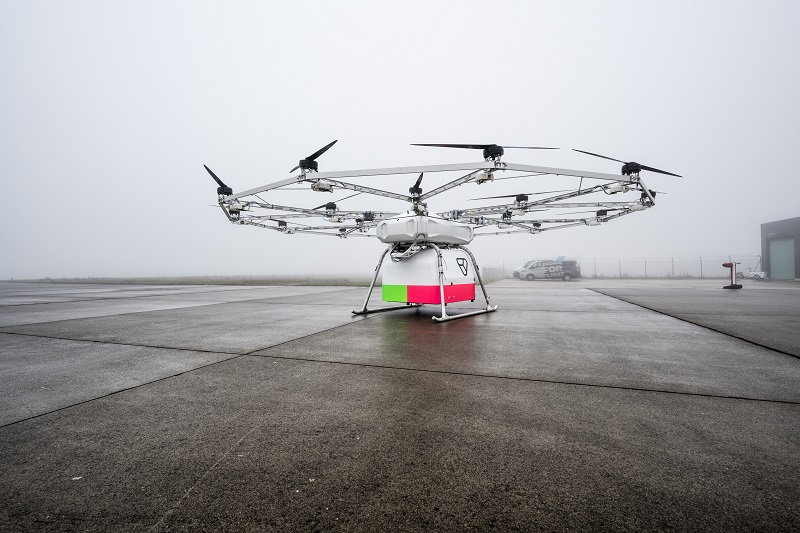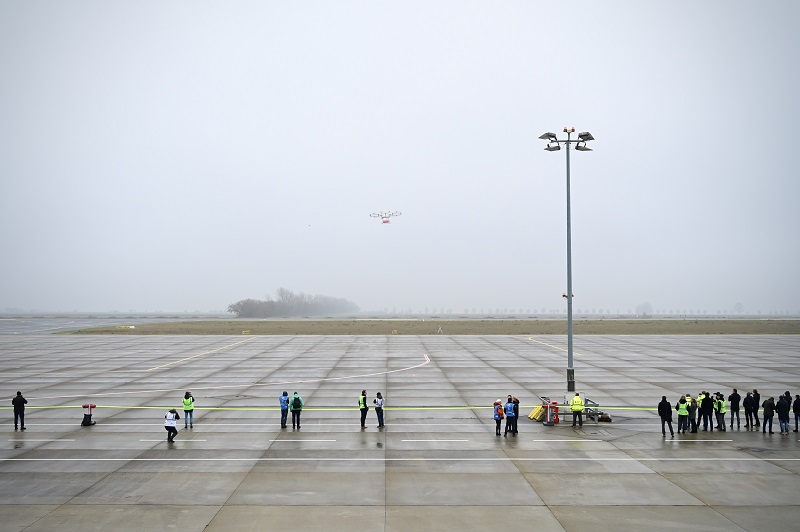Drones and drone technology will change our everyday lives. They may soon be more visible in the skies, ranging from delivery drones to air taxis. But in order for drone flights to become a part of everyday life in the coming decades, clearly defined regulations, flight corridors, and safe air traffic management (ATM) for new airspace users are needed. After all, conventional air traffic and future uncrewed aircraft must operate smoothly and reliably side by side in a safe manner. Flight tests are essential for designing and testing realistic unmanned aircraft system traffic management (UTM) for uncrewed air transport. To this end, a series of large-scale demonstrations (VLDs) have taken place throughout the year within the framework of the EU project CORUS-XUAM. For the project’ final VLD of the year, Volocopter’s VoloDrone was used to fly two research scenarios for urban areas in London and Frankfurt/Main for the first time, at DLR’s National Experimental Test Centre for Unmanned Aircraft Systems at Magdeburg-Cochstedt Airport. The multi-national cooperating research team of DFS Deutsche Flugsicherung GmbH, DLR, Droniq, NATS, and Volocopter presented these flight tests to the invited guests on 30 November 2022.

The VoloDrone is being developed by Volocopter to deliver up to 200 kilograms of cargo in an all electric flight at a distance of up to 40 kilometres. The flight tests in Cochstedt simulated with this drone an air taxi scenario for the connection between the city centre and the major airports within the metropolitan regions of London and Frankfurt/Main. It focused on the digital communication interface for ATM/UTM, including contingency management in the event of unforeseen conflict scenarios, and potential routing and air traffic management solutions. In the scenarios, the flight request, flight planning and flight execution from takeoff to landing were remotely piloted/automated. Up until now, air traffic management in conventional air traffic has been largely based on VHF radio communication between pilots and air traffic controllers. In the future, the operation of a large number of uncrewed aircraft will require a digital and highly-automated system that complements traditional air traffic control systems.

To achieve this, the U-space concept is currently being developed throughout Europe. In the future, drone flights are to operate in U-space airspace – from takeoff, flight, and landing. The flight test demonstration at the Cochstedt drone test site showed how the VoloDrone flies scaled-down versions of the flight routes under research. For the Frankfurt scenario, this was the simulated route between Frankfurt Messe and Frankfurt Airport. For the London scenario, this was a potential route between London City Airport and London Heathrow Airport. Suitable locations for vertiports, takeoff and landing sites for future air taxis were determined for both scenarios. The flight tests focused particularly on the testing of deconfliction manoeuvres and procedures. Exemplary here are prioritized Emergency Medical Services (EMS) aircraft that are given priority: this was clearly demonstrated in the flight tests with an ADAC EMS helicopter in the ‘Frankfurt scenario’, where the VoloDrone automatically adjusted its flight path to avoid the EMS helicopter. In the ‘London scenario’, the research teams tested how reducing the speed of the VoloDrone could be used to maintain separation with commercial air traffic, or to give more time to carry out ground operations at the destination vertiport in preparation for arrival.

Overall, the flight tests in Cochstedt are part of a whole series of demonstration tests within the framework of the EU project CORUS-XUAM. Prior to this, large-scale demonstrations took place in Spain, Italy, France, Sweden and Belgium to gain experience with the integration of uncrewed aerial NATS Internal vehicles alongside existing air traffic in various urban areas. The results will be incorporated into the further development of the European U-space Operations Concept (CONOPS). Well-established standards and regulations for uncrewed air traffic are urgently needed so that the industry can unfold its great predicted development potential. The research work in the CORUS-XUAM project is funded in the EU research programme SESAR under the number 101017682.
About DFS
DFS Deutsche Flugsicherung GmbH, the German air navigation service provider, is a State-owned company under private law with 5,600 employees as at 31 December 2021. DFS ensures the safe and punctual flow of air traffic over Germany. Around 2,200 air traffic controllers guide more than three million flights through German airspace in peak years, up to 10,000 every day. The company operates control centres in Bremen, Karlsruhe, Langen and Munich as well as control towers at the 15 designated international airports in Germany. The subsidiary DFS Aviation Services GmbH markets and sells products and services related to air navigation services, and provides air traffic control at nine regional airports in Germany and at London Gatwick Airport and Edinburgh Airport in the UK. DFS is working on the integration of drones into air traffic and has set up a joint venture, Droniq GmbH, with Deutsche Telekom. Other subsidiaries include R. Eisenschmidt GmbH, which markets publications and products for general aviation, and Kaufbeuren ATM Training GmbH (KAT), which provides training for military air traffic services personnel. The joint venture FCS Flight Calibration Services GmbH offers flight inspection services.
About NATS
NATS is the UK’s principal air navigation services provider and is split into two main businesses, which provide two distinct services:
- NATS (En Route) plc (NERL) — the regulated business, which provides air traffic management services to aircraft within UK airspace and over the eastern part of the North Atlantic; and
- NATS (Services) Ltd (NSL) — the unregulated business, which provides air traffic control services at many of the UK’s major airports (15 civil and 7 military airfields) and other airports overseas.
NATS provides aerodrome, data, engineering, capacity, efficiency and environmental performance solutions to customers worldwide, including airports, airlines, air traffic service providers and governments. NATS handled 1.29m flights in the UK in the last financial year (2021/22), 50% of pre-pandemic traffic levels.
About Droniq
Droniq GmbH is headquartered in Frankfurt am Main, Germany, and is a joint venture between DFS Deutsche Flugsicherung GmbH (DFS) and Deutsche Telekom AG. The object of the company is the provision, distribution and marketing of services for drones and other aircraft in Europe. DFS holds a stake of 51 percent through its subsidiary DFS International Business Services GmbH, while Deutsche Telekom holds a stake of 49 percent through Telekom Innovation Pool GmbH. www.droniq.de
About Volocopter
Volocopter brings urban air mobility (UAM) to megacities worldwide. We aim to improve the quality of life for people in cities by offering a fantastic new mode of transportation. For that, we create sustainable and scalable UAM ecosystems with partners in infrastructure and operations.
Volocopter’s family of eVTOL aircraft will offer passengers (VoloCity and VoloRegion) and goods (VoloDrone) swift, secure, and emission-free connections to their destinations, supported by VoloIQ, the UAM ecosystem’s software platform that serves as its digital backbone for safe and efficient operations. As a pioneer in the UAM industry, Volocopter will launch commercial services within the next few years. Founded in 2011, the company employs more than 500 people in Germany and Singapore, has completed over 1,500 successful public and private test flights, and has diverse investors, including Geely, NEOM, Mercedes-Benz Group, Intel Capital, and BlackRock. www.volocopter.com
About DLR
DLR is the Federal Republic of Germany’s research centre for aeronautics and space. We conduct research and development activities in the fields of aeronautics, space, energy, transport, security and digitalisation. The German Space Agency at DLR plans and implements the national space programme on behalf of the federal government. Two DLR project management agencies oversee funding programmes and support knowledge transfer. Climate, mobility and technology are changing globally. DLR uses the expertise of its 55 research institutes and facilities to develop solutions to these challenges. Our 10,000 employees share a mission – to explore Earth and space and develop technologies for a sustainable future. In doing so, DLR contributes to strengthening Germany’s position as a prime location for research and industry.

